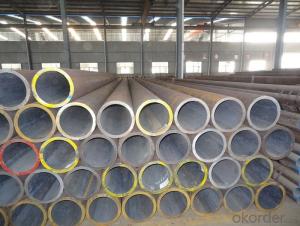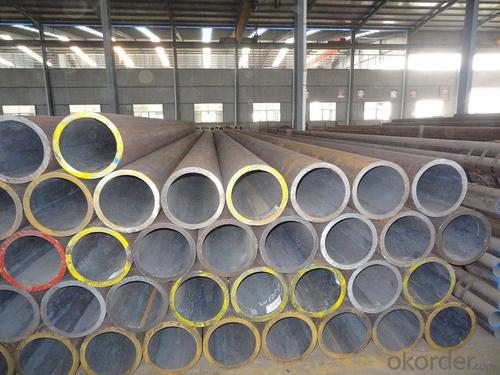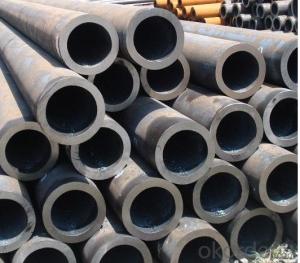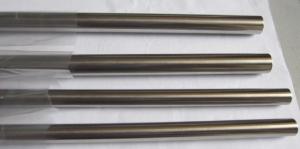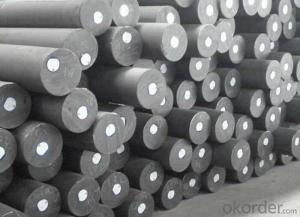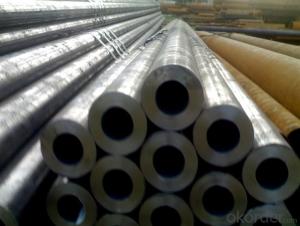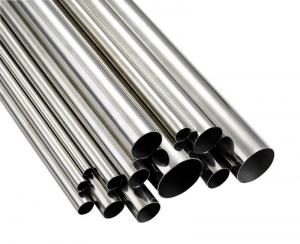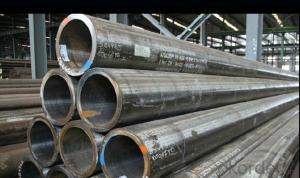Seamless Ferritic Alloy-Steel Pipe for High-Temperature Service ASTM A335 P11
- Loading Port:
- Shanghai
- Payment Terms:
- TT OR LC
- Min Order Qty:
- 1000 kg
- Supply Capability:
- 10000 kg/month
OKorder Service Pledge
OKorder Financial Service
You Might Also Like
Specifications
ASTM A335 Seamless Alloy-Steel Pipe
Standard: BS 1139, BS 3059-2, JIS G3454-2007
Grade: 10#-45#, 15NiCuMoNb5, 10Cr9Mo1VNb
Detailed introduction to ASTM A335 seamless alloy steel pipe:
ASTM A335 seamless alloy steel pipe
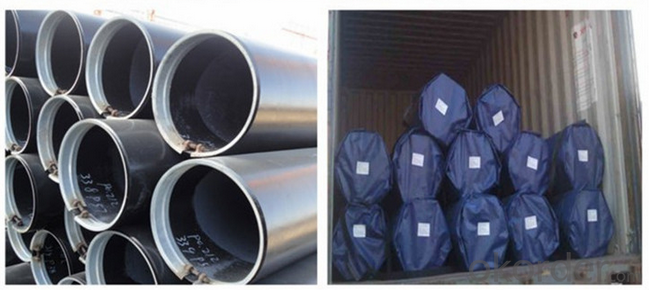
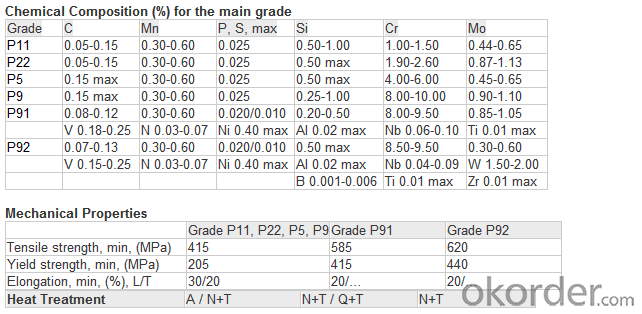
FAQ:
1) why you chose us ?
Professional Manufacturer and supplier of Steel pipe
More than 14 years’ professional producing experience
We can get the lowest ex-factory prices. The price are quite reasonable and it is lower than our commercial peers. also, we can guarantee the qualities of our products.
BV, ISO certificates and SGS test can be provided to assure the quality of our products.
2) Our minimum order quantity:
10 Metric Tons or one 20ft or 40ft Container.
3) How about the Delivery Time?
The steel pipe will be produced since we getting your deposit by T/T or Your original L/C. For normal size, some stocks in our factory now, we can supply once you need.
4)What kind of payment does your company support?
T/T, 100% L/C at sight, Cash, Western Union are all accepted.
5) Do you charge for the samples?
According to our company principle, we just charge for samples, you pay for the freight /courier charge.
6) Main market:
Mid East, South America, Africa, Southeast Asia, India etc
- Q: Can steel pipes be used for underground oil pipelines?
- Yes, steel pipes can be used for underground oil pipelines. Steel pipes are commonly used for this purpose due to their strength, durability, and resistance to corrosion. They are capable of withstanding the high pressure and extreme conditions associated with oil transportation underground.
- Q: How are steel pipes insulated for thermal applications?
- Steel pipes are commonly insulated for thermal applications using various materials such as fiberglass, mineral wool, or foam insulation. These insulating materials are typically wrapped around the steel pipes to create a protective barrier that reduces heat transfer. Additionally, a vapor barrier may be installed to prevent moisture condensation. This insulation helps to maintain the desired temperature of the fluid or gas being transported through the pipes and prevents energy loss.
- Q: How are steel pipes coated for protection against external elements?
- Steel pipes are coated for protection against external elements through a process called pipeline coating. This involves applying a layer of protective material, such as epoxy or polyethylene, onto the surface of the steel pipes. The coating acts as a barrier, preventing corrosion and damage from external factors like moisture, chemicals, and UV radiation. This protective coating ensures the longevity and durability of the steel pipes, even in harsh environments.
- Q: What is the impact of steel pipe size on flow rate and pressure?
- The size or diameter of a steel pipe has a significant impact on both flow rate and pressure. Firstly, the flow rate refers to the volume of fluid that can pass through the pipe per unit of time. A larger pipe diameter allows for a greater flow rate as there is more space for the fluid to move through. This is due to the fact that a larger cross-sectional area of the pipe offers less resistance to the flow of fluid. Therefore, increasing the size of the steel pipe will generally lead to an increase in flow rate. Secondly, the pressure within a pipe is influenced by its size. As the fluid flows through a pipe, it encounters resistance due to friction against the walls of the pipe. This resistance leads to a pressure drop along the length of the pipe. A smaller pipe diameter results in higher frictional losses, which leads to a greater pressure drop. On the other hand, a larger pipe diameter reduces frictional losses and therefore results in a lower pressure drop. Consequently, increasing the size of the steel pipe will generally lead to a decrease in pressure drop. It is important to note that while increasing the size of a steel pipe may generally result in a higher flow rate and lower pressure drop, there are other factors that can also affect these parameters. These include the fluid properties, the length and layout of the pipe, and any additional components such as valves or fittings. Therefore, it is crucial to consider all these factors and conduct proper calculations or simulations to accurately determine the impact of steel pipe size on flow rate and pressure in a specific system.
- Q: What are steel pipes used for?
- Steel pipes find extensive use in a diverse range of industries, serving various purposes. Among the most prevalent applications, steel pipes are commonly employed for the transportation of fluids and gases. In oil and gas pipelines, for instance, steel pipes are utilized to convey oil, natural gas, and other petroleum products across long distances. Additionally, steel pipes are utilized in domestic and industrial water supply systems. Within the construction industry, steel pipes play a pivotal role in structural tasks, offering exceptional strength and durability. Consequently, steel pipes are highly suitable for the construction of buildings, bridges, and other infrastructure projects. Due to their capacity to withstand heavy loads and provide stability, steel pipes are also employed in the construction of high-rise buildings. Moreover, the manufacturing industry heavily relies on steel pipes. These pipes are utilized in the production of machinery, equipment, and vehicles. In bulk handling systems, steel pipes are commonly employed to transport materials like coal, ore, and grain. Furthermore, steel pipes contribute to the manufacturing of automotive components such as exhaust systems, chassis, and suspension parts. In the energy sector, steel pipes serve a multitude of purposes. For instance, they are employed in power plants for the transportation of steam and hot water, as well as in the production and distribution of electricity. Additionally, steel pipes are utilized in the renewable energy sector, particularly in the construction of wind turbine towers and solar panel frameworks. In addition to these primary applications, steel pipes are also utilized in plumbing systems, irrigation systems, and the construction of fences and railings. Their versatility allows for customization, meeting specific requirements in terms of size, thickness, and coating. Ultimately, steel pipes fulfill an indispensable role across numerous industries, facilitating the transport of fluids, the construction of infrastructure, and the manufacturing of various products. Their strength, durability, and adaptability make them a preferred choice among engineers and professionals in various fields.
- Q: Can steel pipes be used for conveying natural gas?
- Yes, steel pipes can be used for conveying natural gas. Steel pipes have been widely used in the natural gas industry due to their strength, durability, and ability to withstand high pressure. Additionally, steel pipes are resistant to corrosion and provide a secure and reliable method for transporting natural gas over long distances.
- Q: Are steel pipes suitable for desalination plants?
- Yes, steel pipes are suitable for desalination plants. Steel pipes offer several advantages that make them a suitable choice for desalination plants. Firstly, steel pipes are highly resistant to corrosion, which is crucial in desalination plants where the presence of saltwater can be highly corrosive. The corrosion resistance of steel pipes ensures the longevity and durability of the infrastructure, reducing maintenance and replacement costs. Secondly, steel pipes have high strength and can withstand high-pressure conditions, which are often required in desalination plants. The ability of steel pipes to handle high-pressure water flow without any deformations or leaks ensures the efficient and reliable operation of the desalination process. Furthermore, steel pipes have excellent heat resistance properties, making them suitable for desalination plants that often involve heat-intensive processes such as distillation or reverse osmosis. Steel pipes can withstand high temperatures without any structural damage, ensuring the safe and efficient transfer of heated water or steam. In addition, steel pipes are readily available and have a wide range of sizes and specifications, allowing for flexibility in design and construction of desalination plants. This availability and versatility make steel pipes a cost-effective choice for desalination projects. Overall, due to their corrosion resistance, high strength, heat resistance, availability, and cost-effectiveness, steel pipes are highly suitable for desalination plants and are widely used in the industry.
- Q: Can steel pipes be used for underground water supply networks?
- Steel pipes are a viable option for underground water supply networks; they possess qualities such as durability, strength, and corrosion resistance. These pipes are commonly employed due to their ability to endure high pressure and bear the weight of the soil and other external forces. Furthermore, steel pipes come in a range of sizes and can be easily welded, making them suitable for diverse water supply system needs. Nevertheless, it is crucial to consider factors like soil quality, the presence of corrosive substances or chemicals, and the necessity of routine maintenance to guarantee the long-lasting effectiveness of steel pipes in underground water supply networks.
- Q: Where is a steel pipe casing usually used?
- The casing, usually used in the basement construction, to protect the pipeline or convenient pipeline installation hoops.
- Q: How are steel pipes used in the manufacturing of agricultural machinery and equipment?
- Due to their various advantageous properties, steel pipes have become widely utilized in the production of agricultural machinery and equipment. These pipes are employed in multiple ways to improve the efficiency and durability of such machinery. A primary application of steel pipes in agricultural machinery is their use in constructing frames and chassis. The exceptional strength and structural integrity of steel pipes make them an ideal choice for supporting heavy loads and enduring the demanding conditions often encountered in agricultural operations. Whether it is a tractor, combine harvester, or tillage equipment, steel pipe frames provide the necessary stability and sturdiness required for these machines to function efficiently in the field. Another common use of steel pipes in agricultural machinery is within hydraulic systems. These pipes function as conduits for hydraulic fluids, ensuring the smooth and reliable operation of various components, such as hydraulic cylinders, pumps, and motors. Thanks to their corrosion resistance and ability to withstand high pressure, steel pipes contribute to the longevity of hydraulic systems, reducing maintenance and repair costs for agricultural machinery. Moreover, steel pipes find application in the exhaust systems of agricultural equipment. To minimize environmental impact and maintain engine performance, it is essential to safely and efficiently expel the exhaust gases produced by engines. Steel pipes with suitable thickness and thermal resistance are employed in constructing exhaust systems, enabling the effective removal of exhaust gases while reducing noise pollution. Additionally, steel pipes are utilized in the manufacturing of irrigation systems and equipment used in agriculture. Whether it involves transporting water from a source to the fields or distributing water to crops through sprinklers or drip irrigation, steel pipes provide the necessary durability and pressure resistance for efficient water delivery while minimizing leaks. In conclusion, the incorporation of steel pipes in the manufacturing of agricultural machinery and equipment plays a vital role in enhancing their performance, durability, and efficiency. The exceptional strength, structural integrity, corrosion resistance, and high pressure capabilities of steel pipes make them indispensable components in various applications within the agricultural sector.
Send your message to us
Seamless Ferritic Alloy-Steel Pipe for High-Temperature Service ASTM A335 P11
- Loading Port:
- Shanghai
- Payment Terms:
- TT OR LC
- Min Order Qty:
- 1000 kg
- Supply Capability:
- 10000 kg/month
OKorder Service Pledge
OKorder Financial Service
Similar products
Hot products
Hot Searches
Related keywords
